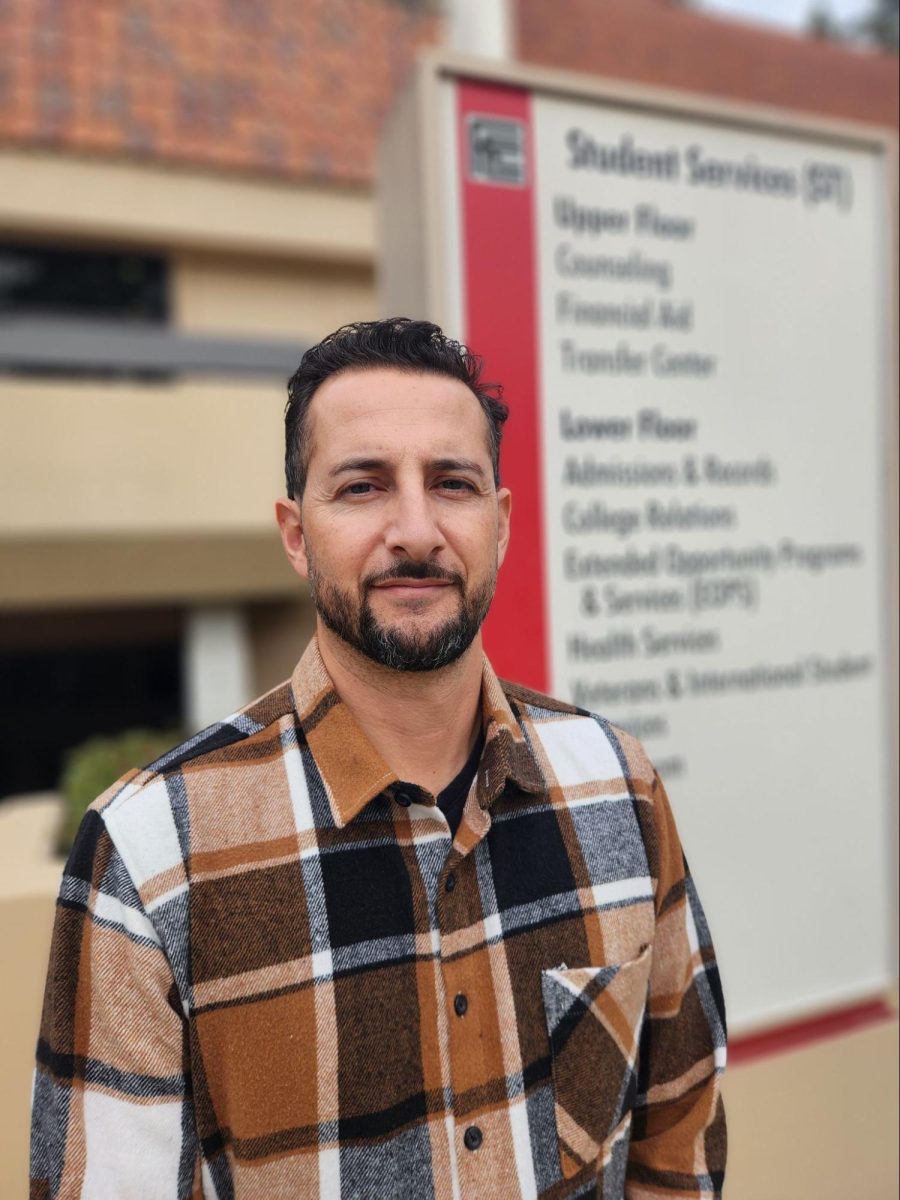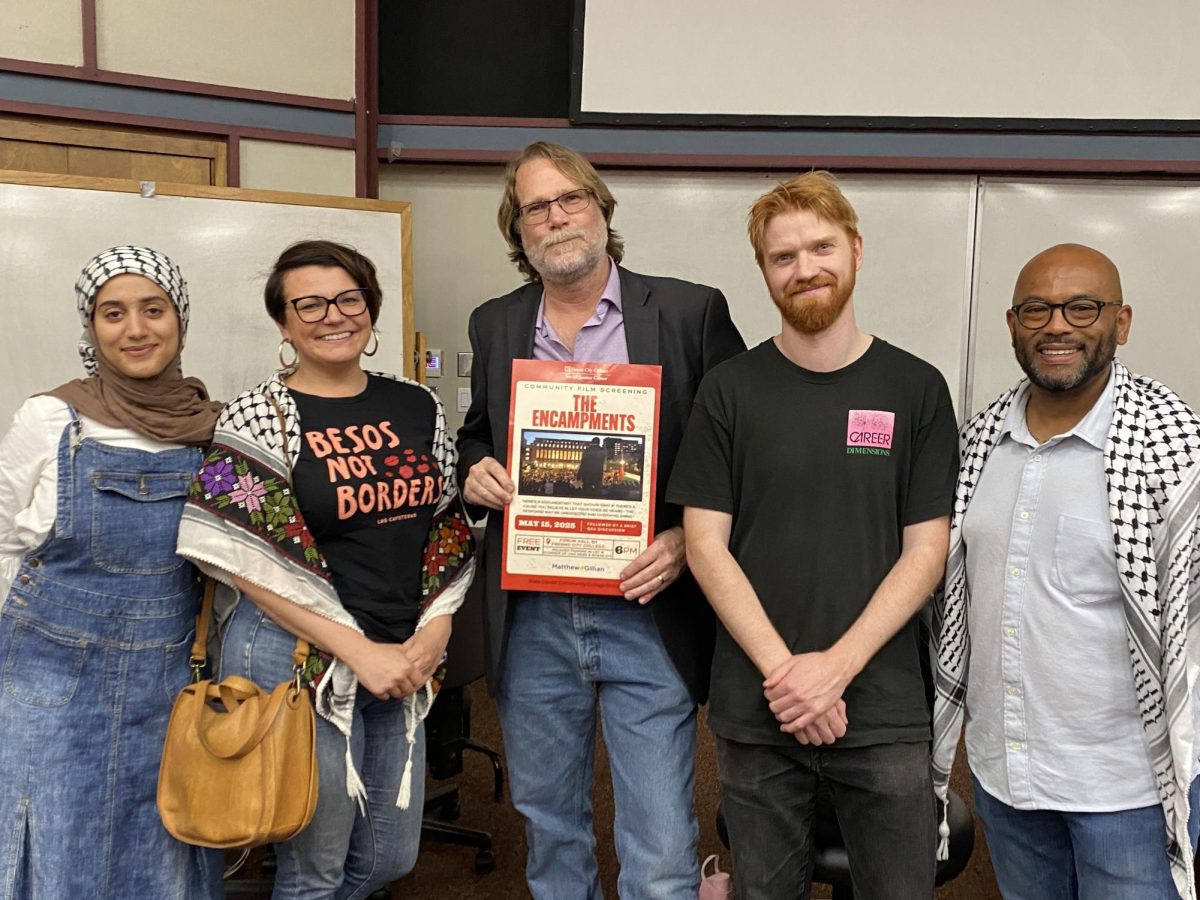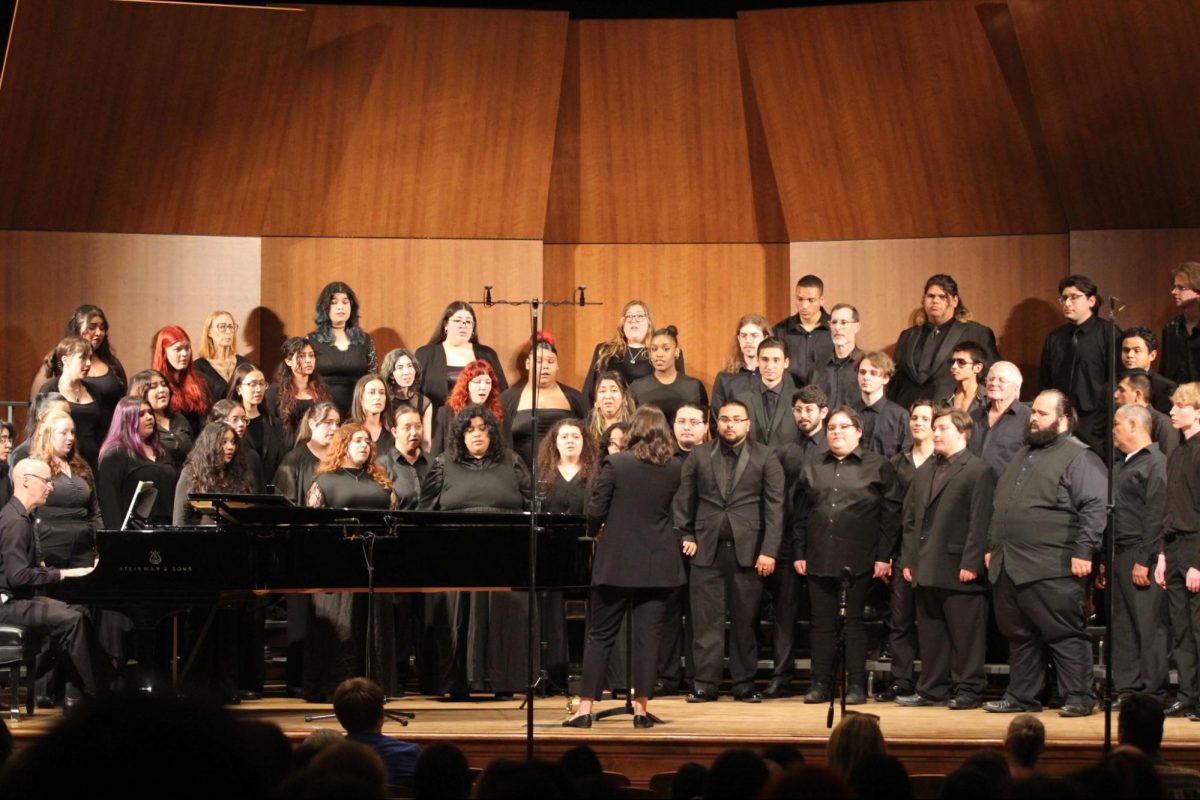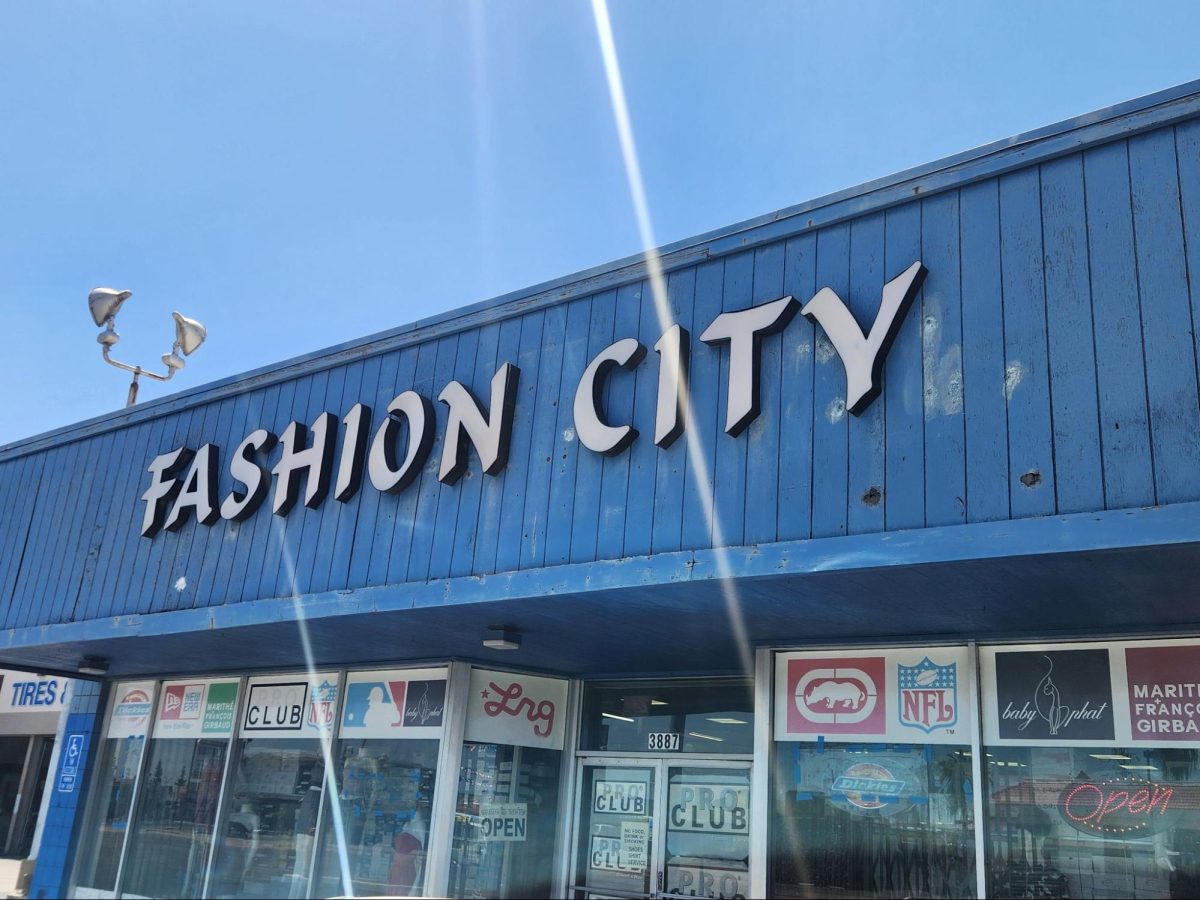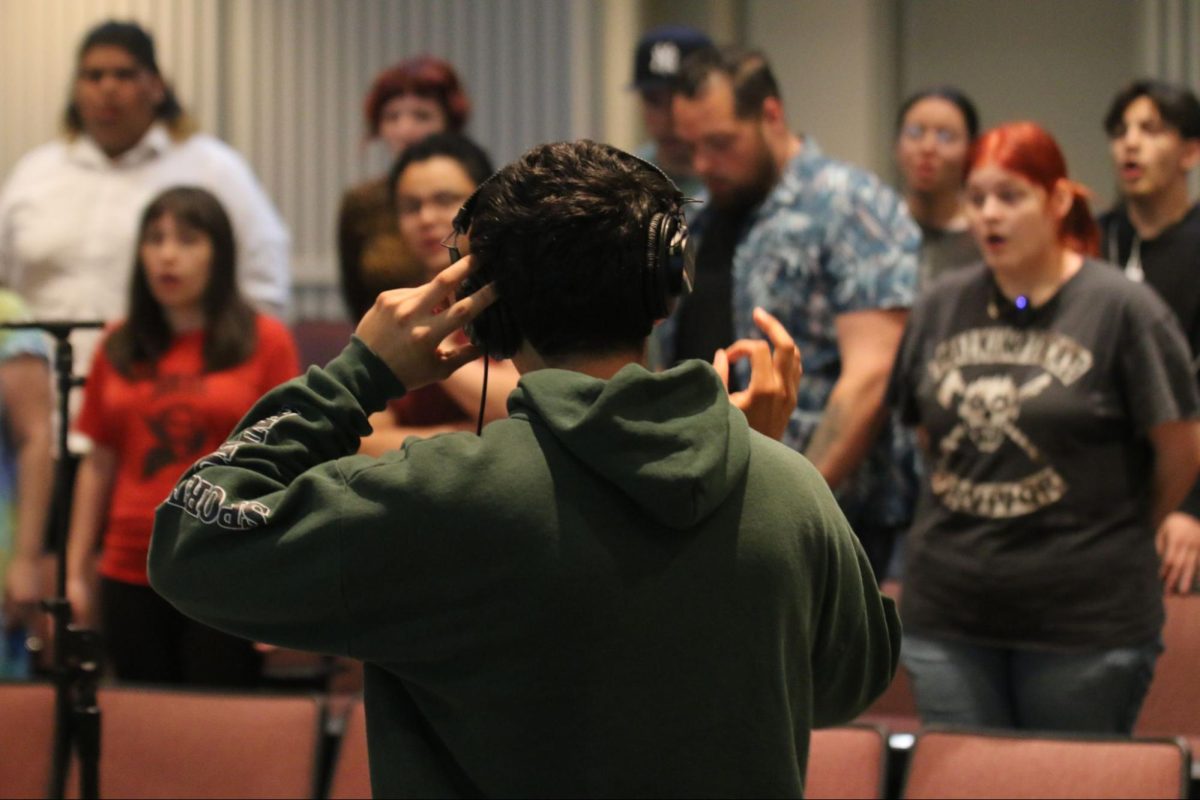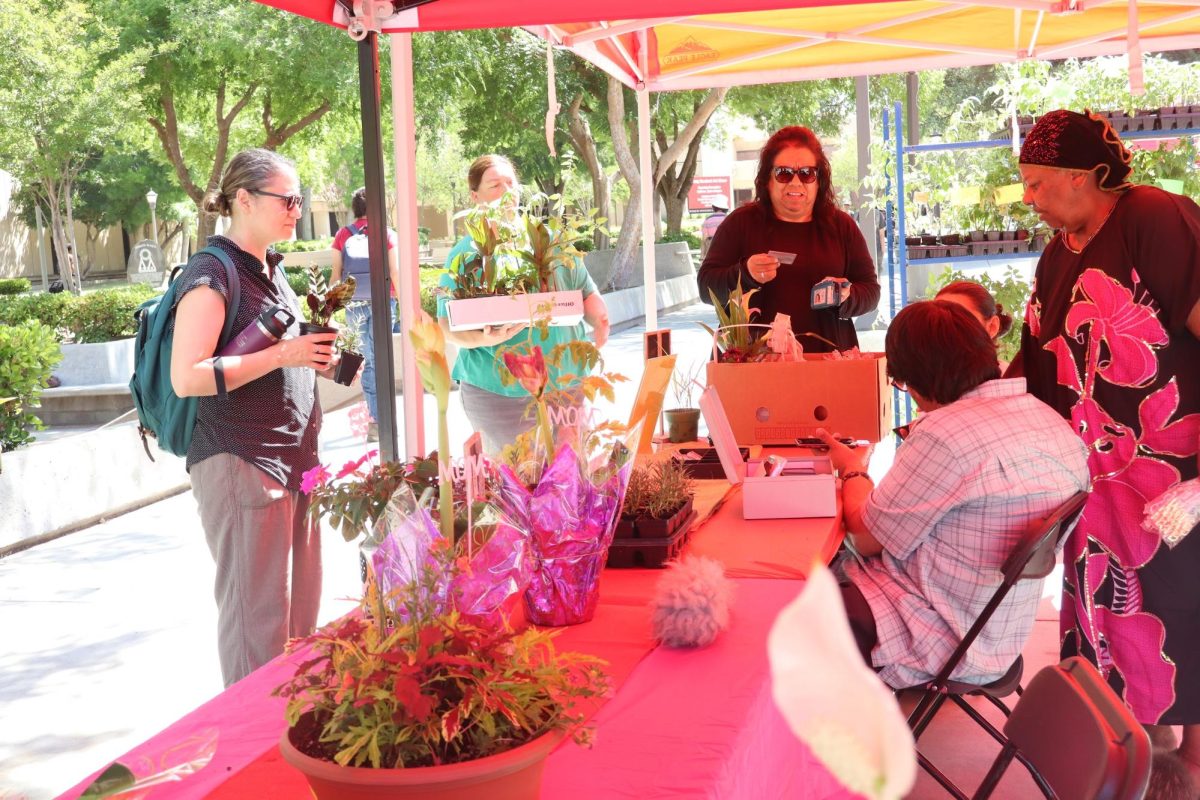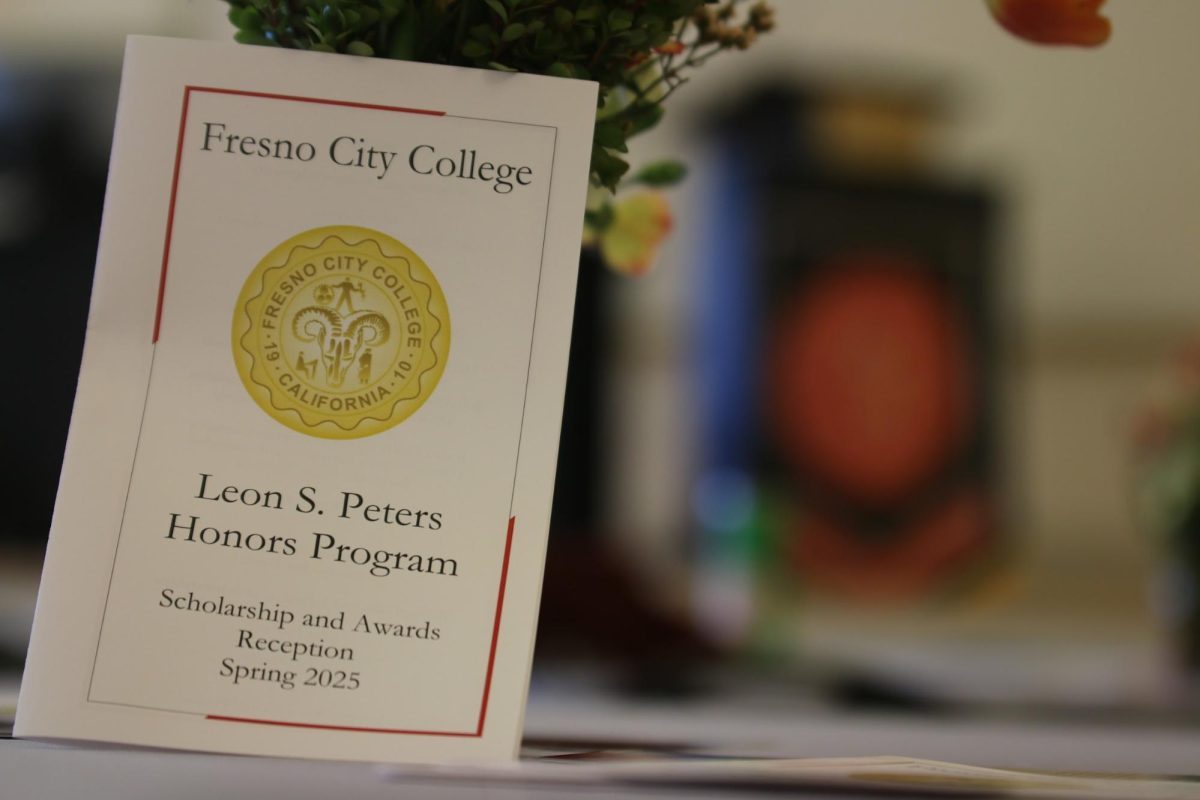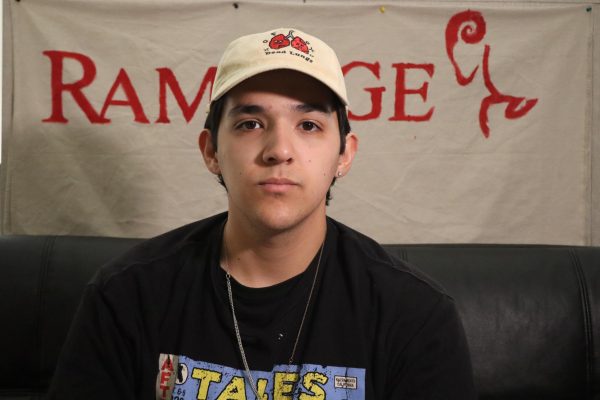In a small office at Fresno City College’s counseling center, Ernesto Cazares leans forward in his chair, his voice steady but warm as he listens to a student share their struggles and inquiries with upcoming classes. As a full-time counselor at FCC for eight years and the counseling lead for FCC’s Puente Program for three, Cazares has spent more than a decade helping students from all walks of life navigate their way to success. But, his connection to their challenges runs deeper than his role. Cazares grew up in a bad neighborhood and into a family that struggled to make ends meet. Within his own journey marked by resilience, self-transformation and a deep love for his family, he’d been shaped into the compassionate leader he is today, making his story one worth telling.
Childhood and Upbringing
Born in the Mayfair neighborhood of Fresno, California, Cazares described his upbringing as rough. He recalled his single mother working long hours cleaning houses as her primary occupation. “She came to this country from El Salvador, and like most immigrants she had to do manual labor jobs,” he said. Due to this, Cazares’s early life was mostly spent with babysitters or at daycare. As he got older and more independent, he would spend more time with friends roaming around town unsupervised. “We did a lot of crazy stuff. It’s kind of a miracle that I’m here before you today,” Cazares said. As he spoke, a sense of nostalgia washed over his face, forming a cheeky smirk with a hand on his chin. To him that part of his childhood was full of “very colorful experiences.” Giving a glimpse into one of those experiences, Cazares recalled that there weren’t a lot of pools in the neighborhood, so going swimming wasn’t something that was readily available. “One of my friends found a vacant house that had a pool, so we all rode our bikes over there, and then, lo and behold, the homeowners come home. And so they start yelling at us, and we got chased down the street,” he said. But not all his moments were so memorable. Unfortunately something that is “all too common” in his type of neighborhood is the threat of gang violence. “I’ve had guns pulled out on me, just random gang members trying to press you. Having to grow up really quick you become street savvy because it’s a survival skill,” Cazares said.
The Road to College and Beyond
Fast forward to high school Cazares said he was not a good student, graduating in 2003. “When I came to Fresno City I continued that poor academic success,” he said. He chose to be a business major at the time because he thought that would be the quickest way to make money and buy himself a Porsche. “As a counselor, I can tell you right now that’s the worst way to pick a major,” Cazares chuckled. He did not know what he wanted to do with his life. His grandmother had also passed away, leading to a feeling of being lost within himself. “The turning point for me was one day I just knew I needed to make a change in my life if I wanted to escape what I call ‘this darkness,’” he said. Cazares immersed himself in his studies, staying late at the library, attending tutoring and studying on the weekends. “I did all the things that a good student should do in order to be successful and achieve their goals. It was at that point that I realized, Fresno City College is this beacon of hope,” he said.
Other than his drive to change he added that there was another factor at play that motivated him to do better. During that following semester in a geology class he described seeing a “really cute girl” that he’d try to be noticed by that whole semester. It would take time, but near the end of it; a simple text telling Cazares to have a good day at work would intertwine their futures. Fast forward to today and they are happily married as Samantha and Ernesto Cazares, with two children and both becoming full-time counselors together. Her presence in his life helped in many ways, but the biggest was that they related to one another. “We just kind of turned to each other and we turned to Fresno City College to lift us out of the situations that we were in,” Cazares said.
However, there were many times that Cazares doubted himself and believed school was not for him. One day early in his college years, even while doing his best as a student, Cazares felt he was still struggling. This caused him to reevaluate what he was doing. “The job prospects for me as an uneducated Latino man were slim, at least decent job prospects,” he said. A manual labor job was not in the cards for Cazares. Gathering some motivation he headed to the Tutorial Center that night to work on a paper. He never forgot that night. It was a late, rainy and dark night during the fall semester. Once finished with his work, he walked out to his truck only to find it stolen. “I was like, is this a sign? Like the universe telling me that I cannot go to college and be successful,” Cazares said. In that same class he wrote for he credited former English professor Louis Contreras for giving him the motivation he needed. “As he’s passing out papers, he looks me in the eye, and he says, ‘You are a very good writer. You need to keep it up,’” Cazares said. It marked the first time Cazares had gotten positive validation from any school official throughout his life. “Oh, I can do this, as long as I put forth the effort I go to tutoring, I work hard, like, there’s no reason why I can’t,” he said. Cazares uses this type of reinforcement to help his own students as a counselor. He wants students to focus on the fact that they’re there, going to school and putting in the work even if it’s stressful. “I’m hoping to drive across the fact that they are worthy of being here and they do belong here,” Cazares said.
Eventually, Cazares would change his major to criminology after watching a homicide detective show and becoming fascinated with that line of work. Steadily, he improved on his classes, making the dean’s list with straight A’s and receiving a degree in criminology. He transferred to Fresno State in 2007. After continuing with the criminology program at state, his ideas of working in law enforcement had faded. A rejection from Fresno PD’s internship program and simply a change of heart would propel Cazares elsewhere. “I thought I could help people in law enforcement, but you’re trying to help people on the worst day of their life, right? I thought I’d rather be proactive than reactive in helping my community,” Cazares said.
This transition was bumpy for Cazares with the Great Recession. As people around the country lost their jobs and homes, Fresno State’s counseling program had reduced the amount of students they were accepting. Yet, he chose to take the leap of faith. Cazares spoke to his counselor and began his master’s program. Before completing it he would recall his internship he took at FCC, marking the beginning of his career on campus. Cazares noted the dean at Fresno State at the time who helped him get his position, Mark Sanchez. “He was very willing to help people in our community, especially people of color,” Cazares said. Come 2012 and Cazares would be offered an adjunct position at FCC. After more funding came to the school and new positions were added Cazares would reach full-time status in 2016 and became a tenured counselor in 2021.
Throughout all of his schooling and all of the challenges that came with it, Cazares’s wife has been his biggest supporter. “When I’ve had to sacrifice time away from the family. She’s been in support of that because she knew that was how we would get ahead as a family,” he said. From studying together since 2005 to transferring colleges and walking down the graduation aisle together less than a decade later their story with one another is one of great triumph. She gave Cazares the confidence and the backbone he needed whenever he doubted himself.
“I feel accomplished,” Cazares said, looking back on his progress. To him, a boy living with a single mother in an impoverished neighborhood does not have favorable statistics. His mother who had recently passed away, instilled the importance of hard work and education into him. “She would always tell me, ‘they can take your home away, they can take your car away, but they can’t take your education away,’” Cazares said. Working so hard during her own life it motivated him to do the same. “So when I look back on everything, how far I’ve come, I think about how much sacrifice went into that, and how proud I am of myself,” Cazares stated.
Passions and Pastimes
As we talked with one another, I noticed a great deal of personality and character traits that emanated not just off Cazares but off the very walls of his office. Even a quick glance from the hallway door could tell you that he was a Dodgers fan. Bobbleheads of his team’s players lined the shelves high and low with posters and jerseys to match. “They bring me a lot of happiness when I look at them,” Cazares said smiling. “The bobble heads are gifts from friends, family, a lot of them are from coworkers here.” An American flag sat on the wall alongside his bobbles and many pictures of his family dotted a bulletin board which conveyed a heavy emphasis on his love for them. “I think my decor humanizes me to my students,” Cazares said. If there were only academic themed decorations in his office it just isn’t that personal according to him. “I don’t think there’s anything wrong with that, but I like students to know about me,” he said. Additionally, smaller things like a Hotwheels of his “Dodger Blue” Toyota Tacoma and a golf poster can tell you a bit more about who he is and what he enjoys. “I grew up playing baseball, so the natural transition for me was to play golf…That would be one of my favorite pastimes,” Cazares said. Jujitsu however, is his most recent hobby, having just passed his two year anniversary for practicing the martial art.
Present Day
Well established and comfortable in his position, Cazares feels his work life is pretty fun. He feels close to his colleagues, having worked in his department for years now. “We support each other, we have disagreements, but that’s healthy,” Cazares stated with an understanding tone.
One of those colleagues is counselor Gerard Johnson. Having known Cazares since 2012, he recalls they bonded together while Johnson served his post-graduation internship at FCC. Over time Johnson credited Cazares with his ability to foster a friendship between the two. “He interacted, not gregarious, but friendly and embracing,” Johnson said. He believed Cazares to be of strong character who acts with the intention of doing things the right way. “Whether it’s work, personal life, whatever it is he wants to, he wants to just be a good man about things,” Johnson said. Speaking to Cazares’s caring nature, Johnson told of a recent moment where he felt valued in their friendship. Having dealt with personal troubles that day, Cazares pulled him to the side trying to evaluate what was wrong. “No one else did that. When I started sharing what was going on with me, people were like, oh yeah, I kind of noticed there was something. But he was the person to say, ‘I know that there’s something going on,’” Johnson said. To him, moments like that truly speak to Cazares’s ability to empathize with others and to have that emotional intelligence. However, along with his good qualities, Johnson believes Cazares’s worst one to be an unwillingness to put himself out there. Cazares has a lot of ideas, a lot he wants to say, but the concern of being criticized or not being taken seriously holds him back according to Johnson. Johnson adds that Cazares’s character and emotional intelligence make him a leader but “I can see that reluctance in him to fully embrace that.” Reflecting on his work at FCC, Johnson believed “It’s a very meaningful and impactful place and people like Ernesto help it be that.”
Cazares’s perspective is always one of high morale in the office according to him. Although there are definitely days that tire him more than others. A typical day will consist mainly of meeting with students going to meetings and oftentimes coordinating with FCC’s Puente program staff. Puente is a statewide program with a mission to increase the number of educationally under-represented students enrolled in four year colleges and universities since 1981. With FCC’s chapter being opened in 1987, he feels honored to be a part of a legacy that stretches back decades before him. “I work with a fabulous team of counselors and instructors,” Cazares said. Cazares tells of the benefits for students he’s seen while being a part of the program. According to him “Puentistas,” have a higher success rate in classes such as English 1A and English 3 than compared to their peers. Additionally, they are more likely to transfer to four year institutions as well. “I think Puente contributes to that by building on the strengths of the students that we have,” he said. Recruiting students often starts in high schools. Once enrolled, students will be given orientation and counseling classes with Puente counselors. These classes help educate them on how to be successful at FCC, presenting them with resources they can access to help themselves throughout their college career. Puente instructors in subjects like English and Chicano Studies contribute to their students’ success too. “The student has a great understanding of not only themselves, but of their culture and how rich their history is,” he said. Cazares asserts that it is beneficial for students to be taught about and surrounded by successful teachers, authors, etc., who have similar backgrounds. Then Puentistas can identify with those people and add to their motivation. Puentes Mentor program is a great example of trying to foster that type of motivation as well. “One of the main pillars of Puente, it’s in its goals, its objectives, is to groom tomorrow’s leaders,” Cazares said. To do that, this program matches new Puentistas with past Puentistas who are now community leaders. “I think it’s powerful,” Cazares said.
Cazares loves his job and has never thought of doing anything else other than being a professional golfer. “It has a lot of cool perks, but first and foremost I get to help people from my community who are experiencing the same things that I did,” Cazares said with a matter-of-fact nature in his voice. Cazares has never given the idea of being anywhere else much attention because of how happy he is at FCC. As a father of two, he enjoys the job’s flexibility. “I get to be at home with my kids in the summer and be with them while they grow up, and be the dad that I did not have. I feel like I hit the jackpot,” Cazares said.
There are certain drawbacks, however. Cazares feels that certain spending policies in place are not as efficient as they could be. This grey area has caused complications when trying to provide for and assist students. For example, the Puente program has a lot of funds, but sometimes their hands are tied on what they are able to do for students, often being told no on spending choices, according to Cazares. “Although it has gotten better as of late, I feel like it could always be better,” he said. Cazares hopes the next vice president of administration services might be able to fix these issues. Additionally, he feels the administrators are also doing what they can and are usually open to discussion on how to improve. “They champion equity themselves. They practice it and in their roles as administrators. I think that I’m very fortunate to work under folks who share that same goal to ensure the success of our students,” Cazares said. He would also like to see a change in the lack of counselors. Cazares is very understanding of his bias and how administrators might be doing their best. However, there were around 30,000 students enrolled on campus this semester with only 150 counselors to service them all, with many of those staff members being online staff working from home through Zoom. He said some students wait for over an hour just to see a counselor.
His favorite part of the job is his students and being proactive within the community. “I grew up down the street from here, and so I see myself and my students, I feel like I’m giving back to myself and my community,” he said. Cazares will run into his former students who are getting married, having kids, working good jobs and that is what it’s all about to him. “I think that all of my students would have done that with or without me, but it’s awesome and amazing that I get to be a part of that,” he said. Considering himself an anchor to campus, Cazares wants to always be accessible to students who want to come back to school and help improve the lives of whoever he can. “The problem that I have is that there’s so many students who come see me that my schedule books up,” he said.
Years ago, the life he has now would’ve seemed impossible. “Crazy” is how he’d described it, remarking he feels blessed to have subverted those expectations. “I didn’t believe that I had what it took. I just enjoyed playing sports and having fun,” he said. Cazares believes that not many students are exposed to many careers except the ones within our community such as firefighters, police officers, teachers etc. He was one of those students, someone lost in pursuit of a goal he hadn’t figured out yet. “If you would ask freshman at Fresno City College Ernesto, I would have been lying to you and giving you an answer that I didn’t even believe,” Cazares said.
Food for Thought
Offering a glimpse into his mind, Cazares shared he hasn’t much use for a lot of money. If he were to win a million dollars, he tossed around the idea of getting that Porsche he always wanted, but laughed it off as an idea from his younger days. “What’s even better is having time. Having time to do what you want to do,” he said. It led into speaking on the importance of mental health days and being able to get away when you can, but also being able to come back strong for whatever you need to do. “That way you can be at your best to give to your students, your family and your friends,” he said. Burnout is very real, and to him it happens especially in his profession. He credited the current FCC Dean of Counseling, Kurt Piland, for giving himself and his colleagues opportunities to work only for the programs they are a part of without the added workload of counseling. “There’s a lot more to counseling than seeing students,” Cazares stated. The assigned projects and committee work are a large part of his job. “It’s needed. But for example, in Puente there’s a lot of behind the scenes stuff that we have to get done,” he said.
Future Plans and Motivating Words
Eventually, Cazares desires to train a successor to himself for Puente. Traditionally, three years is the unofficial term limit, and with the spring semester rolling around, Cazares would be passing that threshold. Adding onto that, he wants to be on more committees and advocacy groups across campus. “I love Fresno City College so much, I want to be on some sort of committee…like an administrative committee that covers and advocates and recommends changes like our logistics…reserving for different spaces across campus,” he said. Skipping from the immediate to far future, Cazares would love to golf more and spend time with his family once he retires. He wants to care for his kids and their kids, spoiling them and living his own happily ever after.
Overlooking his whole career at FCC, his education and where it all got him in life, he feels it has become his life and identity. “I’m not a person to boast about what I do and all my accolades. But I think my accolades are my students and the success of my students,” he said. Cazares would be devastated if he couldn’t work the job he does anymore. “I enjoy everything I do. It’s so profound. I have the ability to change people’s lives in a positive way,” Cazares said. His biggest piece of advice he could offer as a counselor is to learn to be a good student. Oftentimes people show up to FCC thinking they’re going to do great and it’s only going to be easy. Most of the time, that just isn’t the case. “It requires a lot of hard work hours in the tutoring center, which I encourage all my students, words of wisdom,” Cazares said emphasizing the importance of putting in the effort and tossing aside distractions.
“If you want to be successful, you have to really sacrifice and put in the work. There’s agency in your success, meaning you are responsible for your success. We will help you as a college. We have the services in place to give you the best that we can, but at some point, you were responsible for your success,” Cazares said.

